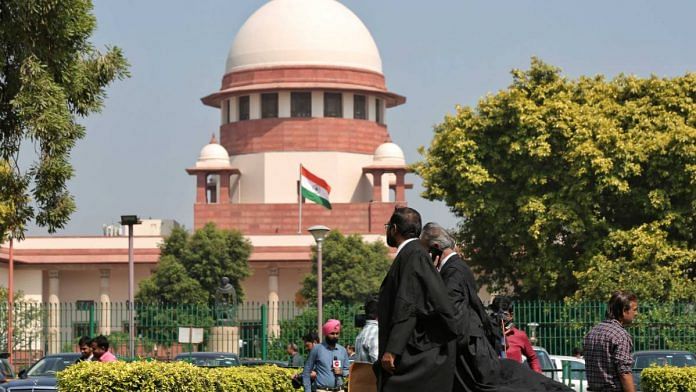New Delhi: Delays are not just a lower court issue in India, but also affect the highest court of the land, revealed a new study whose findings have been presented in a book titled Court on Trial: A Data-Driven Account of the Supreme Court of India. According to the book, 39.57 per cent of cases in the Supreme Court were stuck for over five years and an additional 7.74 per cent for over 10 years as of November 2018.
The book, published by Penguin India this month, uses data composed of information scraped from the Supreme Court of India website in November 2018. The data covered the years from 2000 to 2018 and included more than one million pending and decided cases for which information is available on the Supreme Court website.
Court on Trial has been authored by Aparna Chandra, associate professor of law at the National Law School of India University, Bengaluru; Sital Kalantry, professor of law and associate dean at the Seattle University School of Law; and William H.J. Hubbard, professor of Law at the University of Chicago Law School. It presents a data-driven account of the Supreme Court and proposes a practical agenda for reform.
“It is well known that cases can take decades to resolve within the Indian judicial system…What is less well-known is that delay is not just a problem for the lower courts of India, but a serious problem in the Supreme Court too,” the book said, highlighting the delays in the Supreme Court.
According to the book, the National Judicial Data Grid (NJDG), which was put in place by the Supreme Court itself, does not provide data for the Supreme Court. NJDG is a database of orders, judgments and case details of lower courts and high courts, created as an online platform under the eCourts Project.
“This is perhaps a reflection of the fact that in judicial policy-making circles, delay is often seen as a lower court problem,” it added.
The data cited in the book showed that the Constitution Bench matters that were pending as of November 2018 had been waiting for more than eight-and-a-half years on average, with seven-judge bench matters taking more than 16 years on average.
Between 2000 and 2018, matters relating to land laws, education, money, crime and family law, were pending on average for over six-and-a-half years, the book shows. During the same period, 22 habeas corpus matters in the Supreme Court have been pending on average for two-and-a-half years, with half the matters pending for more than two years, the book revealed.
Also Read: ‘Laws expire at UP border’: In the MP/MLA courts of the ganglands, cases come to crawl
SLPs crowding the court
The book also explored the causes and consequences of the delay and cited “docket explosion” (the rate at which cases are filed) as one of the reasons. It pointed out that the Supreme Court now receives 60,000 appeals and petitions every year, compared to 20,000 in 1980.
According to the book, Public Interest Litigations (PILs), which often receive the most limelight, comprise only about 0.6 per cent of the court’s caseload and form only 3 per cent of its reported judgments.
On the other hand, appeals from orders of lower courts and tribunals, a bulk of them under the court’s Special Leave Petition (SLP) jurisdiction, make up about 99 per cent of the SC’s docket of pending cases, and about 88 per cent of its docket of admitted and disposed matters.
Article 136 of the Constitution gives the apex court a very broad discretionary power to grant “special leave to appeal from any judgment, decree, determination, sentence or order in any cause or matter passed or made by any court or tribunal in the territory of India”. Such petitions are called ‘special leave petitions’, and it is used as a mode to appeal to the Supreme Court.
The book claimed that the heavy backlog has “allowed the court to avoid difficult cases by the simple expedient of not deciding such cases at all”.
It cited the example of the challenge to Aadhaar — the government’s universal biometric identification scheme — and said the SC took five years, without issuing a stay, to decide the challenge, by which time, the scheme “had more than a billion enrollees, thus rendering the challenge virtually ineffective”.
Furthermore, it also gave the example of the challenge against electoral bonds, pending since 2018.
The book concluded that the backlog of cases in the Supreme Court pushes out important cases and likely affects the most vulnerable litigants disproportionately.
(Edited by Richa Mishra)
Also Read: Case finder software to Judges Act amendment—20 steps to end pendency in Indian Courts



